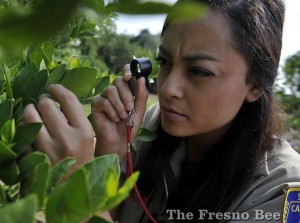
Cora Barrera, a CDFA inspector, uses a magnifier as she searches for Asian citrus psyllids in a citrus grove in Fresno.
ERIC PAUL ZAMORA — THE FRESNO BEE
By Robert Rodriguez
Armed with magnifying glasses and bug-sucking aspirators, state agriculture technicians are in Fresno, checking residential citrus trees for any signs of the Asian citrus psyllid and the tree-killing disease it can carry.
The psyllid poses one of the greatest threats to California’s nearly $2 billion citrus industry and officials want to keep it from gaining a foothold in the central San Joaquin Valley.
Inspectors will spend several weeks in the Fresno area and then move into Tulare County — the largest citrus producer in the state.
“We don’t want this disease here,” said Cora Barrera, a state technician. “It would be a disaster.”
Barrera recently checked several trees at a home near Fresno Pacific University in southeast Fresno. Using her magnifying glass, she looked for tell-tale signs on the tree’s leaves: dull orange-yellow nymphs and the waxy tubules that push honeydew away from their body. She also looked for adult psyllids that are about 1/8 of an inch and brownish.
When Barrera finds a psyllid, she catches the insect using an aspirator and drops it into a glass tube. Any bugs caught will be tested for the disease.
A team of about six state technicians, including Barrera, will visit thousands of homes in the city.
Jennifer Romero, an environmental scientist with the California Department of Food and Agriculture, said that so far no psyllids have been found nor any sign of the disease they carry, huanglongbing, also known as citrus greening.
Citrus farmers fear the disease because there is no known cure. Infected trees produce bitter-tasting fruit and eventually die. In Florida, the nation’s orange juice capital, the disease has caused $1.3 billion in lost revenue over the past several years.
So far, the disease has only been found in one residential tree in the Hacienda Heights area of Southern California. But the psyllids have spread throughout the region, and a massive quarantine prohibits the movement of citrus fruit and trees out of the area.
Despite the regulatory net, the bug has hitchhiked its way to the Valley, having been caught in insect traps in Fresno and Tulare counties. To keep the psyllid in check, farmers have sprayed their groves and the state has treated residential trees where the psyllids have been caught.
A quarantine also has been put in place that covers 870 square miles of the Valley’s citrus belt.
But all that still isn’t enough, experts say. One key lesson learned from Florida’s losing battle with the disease is early detection and prevention.
Door-to-door residential inspections have been used in Southern California since the discovery of the disease in 2012.
Using a method developed by U.S. Department of Agriculture scientist Tim Gottwald, the survey targets specific areas with potential risk factors. The factors are many, but include proximity to commercial citrus groves, roads used by trucks transporting citrus and flea markets.
Experts say citrus trees at flea markets and swap meets are sold without the benefit of government inspection and should be avoided.
So far, the state’s inspectors have surveyed more than 1,000 homes in Fresno and hundreds more remain.
Romero said fortunately for the inspectors most residents don’t mind the visits.
“We really have not had any problems and it helps that people are aware of the disease,” she said. “They also don’t want to lose their own trees.”
If the resident isn’t home, the state will leave an information sheet about the bug and disease and information for setting up a future home visit.
Gene Hannon, entomologist with the Fresno County Department of Agriculture, urged owners of citrus trees to be vigilant about checking their own trees. He also said that people should avoid bringing home any citrus from the Southern California area; buying citrus trees at flea markets; or grafting trees from Southern California or any other region with the disease.
“The more people are aware, the better able we are to keep this disease out of our area,” Hannon said. “We don’t want to have this problem.”



2 Responses to Inspections underway in Central Valley for huanglongbing, Asian citrus psyllid – from the Fresno Bee